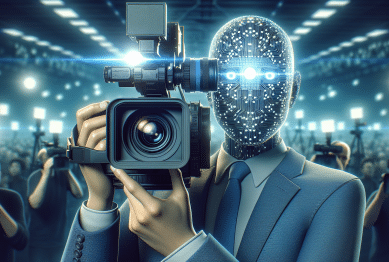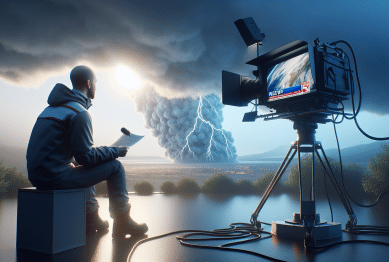In 2025, the AI entertainment industry is redefining what it means to be enthralled. From AI-restored classics projected in immersive domes to the rise of generative media, artificial intelligence is shaping both how stories are told and how they’re experienced. Let’s explore the top trends—enhanced cinematic experiences, production automation, surreal “AI slop” content, AI-powered workflows, and game development—and how they’re transforming entertainment.
In this article, we will explore how AI is changing the entertainment industry, focusing on key emerging trends that are influencing film, television, music, and gaming.

AI in Scriptwriting and Content Creation
Traditionally, writing scripts and developing creative content has been seen as uniquely human territory. However, AI tools are now entering the creative pipeline. For example, machine learning models are capable of generating dialogue, proposing storylines, or even producing entire scripts.
Moreover, companies such as OpenAI and Runway are offering tools that assist creators in brainstorming, editing, or rewriting scenes. Instead of replacing human writers, these systems often serve as collaborative partners. Writers can use AI to quickly generate draft ideas, which are then refined into compelling narratives.
As a result, the production process becomes faster, allowing studios to test multiple creative directions before committing resources. Although some critics worry about originality, many argue that AI tools can enhance creativity rather than diminish it.
Personalized Recommendations and Audience Insights
Most streaming platforms already use recommendation algorithms, but the sophistication of these systems is increasing rapidly. Platforms like Netflix and Spotify analyze massive amounts of data to suggest content.
In addition, AI systems are moving beyond simple recommendations. They now analyze viewing behavior, mood, and even biometric responses. For instance, algorithms can track how long users engage with specific content and predict what type of shows or songs will resonate in the future.
Consequently, entertainment companies can produce content that aligns more closely with audience demand. This not only increases user satisfaction but also helps platforms reduce churn.
AI-Generated Visuals and Virtual Actors
Another powerful trend is the rise of AI-generated visuals and virtual actors. Using deep learning, companies can create photorealistic characters that perform without human intervention.
For instance, AI-generated actors can appear in commercials, films, or even livestream events. Startups such as Synthesia are producing AI-driven avatars capable of delivering presentations, acting, or even singing.
Furthermore, visual effects (VFX) studios increasingly rely on AI to speed up rendering, de-aging actors, or replicating complex environments. Instead of requiring weeks of manual editing, AI tools can now automate parts of the VFX pipeline, making productions more efficient and cost-effective.
AI in Music Production
AI is also reshaping how music is composed and produced. Programs like AIVA and Amper Music generate original compositions in seconds, tailored to specific moods or genres.
Similarly, musicians are using AI to experiment with new sounds, remix tracks, or analyze trends in listener preferences. As a result, independent artists with limited budgets can access professional-level tools once reserved for large studios.
On the other hand, ethical debates remain unresolved. Some argue that AI-generated music challenges the definition of originality, while others view it as a new instrument in the artist’s toolkit.
Gaming and Interactive Experiences
Gaming is one of the most innovative fields for AI application. Traditionally, AI in games has been used to control non-player characters (NPCs). However, modern AI goes far beyond basic automation.
For example, procedural content generation allows games to create vast, dynamic environments that adapt to the player’s actions. In addition, natural language processing enables real-time conversations with in-game characters, making gameplay more immersive.
Consequently, gaming companies are investing heavily in AI-driven personalization. Imagine a game that evolves in response to your unique playing style—this is quickly becoming a reality.
Deepfakes and Ethical Considerations
While the creative opportunities are vast, AI also introduces ethical challenges. Deepfake technology, which allows realistic manipulation of audio and video, is particularly controversial.
On one hand, studios can use deepfakes for beneficial purposes, such as bringing back historical figures or rejuvenating aging actors. On the other hand, misuse can spread misinformation or violate personal rights.
Therefore, regulations and ethical standards are becoming increasingly important. The entertainment industry must balance innovation with responsibility to maintain trust and credibility.
Fan Engagement and Virtual Experiences
AI is also changing how fans interact with entertainment. Chatbots and AI-powered assistants allow celebrities and studios to engage with audiences on a more personal level.
For instance, virtual meet-and-greets or AI-driven fan clubs provide experiences that were once impossible. Moreover, recommendation engines can personalize merchandise suggestions, ticket offers, or exclusive content for each fan.
As a result, companies can build stronger connections with audiences, turning casual viewers into loyal communities.
The Future of Entertainment with AI
Looking ahead, the integration of AI into entertainment will only accelerate. Content creation, distribution, and consumption are all being reshaped by these tools.
In fact, experts predict that AI will soon play a central role in co-creating films, designing virtual concert venues, and powering interactive experiences that blur the line between physical and digital worlds.
However, the key challenge will be maintaining a balance between human creativity and algorithmic efficiency. Audiences still crave authentic stories, emotions, and connections—elements that technology alone cannot replicate.
Conclusion
The question is no longer whether AI will impact entertainment, but how AI is changing the entertainment industry and what this means for creators, businesses, and audiences. From personalized streaming recommendations to AI-generated music and virtual actors, the transformation is undeniable.
Ultimately, AI offers the potential to make entertainment more immersive, efficient, and accessible. Yet it also raises questions of originality, ethics, and responsibility. As the technology continues to advance, the most successful companies will be those that embrace AI while preserving the distinctly human aspects of creativity.
References:
- McKinsey & Company. (2024). How generative AI is reshaping media and entertainment.
https://www.mckinsey.com/industries/technology-media-and-telecommunications/our-insights/how-generative-ai-is-reshaping-media-and-entertainment - PwC. (2023). Generative AI and its impact on the media industry.
https://www.pwc.com/gx/en/industries/technology/publications/generative-ai-media.html - Variety. (2024). Hollywood debates the promise and risks of AI in film and TV.
https://variety.com/2024/film/news/hollywood-ai-movies-tv-1235965704/









